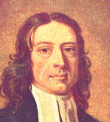In writing Confidence in the Word we have tried as far as possible to observe the elder Wesley's precept. We have, therefore, sought to avoid writing about the Bible, but instead have done our utmost simply to allow the Bible to speak for itself. We have preferred this method, out of conviction borne of many years' acquaintance with the Scriptures that, if the Bible is approached in the right way, it is largely self-interpreting.
The Puritans used to speak of the perspicuity of Scripture, By this they meant that the Bible has qualities of lucidity and transparency which allow it to be easily understood in its plain meaning by all who will read it in humble dependence on the Holy Spirit. They were convinced that the Bible simply says what it means and means what it says. In other words, for them, Scripture contained no second meanings, hidden messages or secret codes. This is something of which we too are convinced.
(We explore
the implications of this more fully in considering the Bible as A User-friendly Book.)
Moreover, we are also convinced that the Bible is well able to defend itself against any detractors without external assistance.
"But," you may be thinking, "Aren't the discoveries made by archaeologists and others really more important than the evidence of the Bible itself, because they give us independent proof that the Bible is true?"
We readily accept that the Bible's accuracy can in many cases be confirmed by evidence offered by archaeology, science, contemporary secular writings, textual considerations and the like. Even so, we are persuaded these things are secondary to the confidence to be gained from acquaintance with the Bible itself. While we would agree that external evidence may serve to enhance existing confidence in the accuracy of the biblical record, we are extremely doubtful if it is likely either to create such confidence in the first place, or to restore it once it has been lost.
A moment's reflection will tell us that, even if every person, place and event in the Bible could be independently verified - and many of them can - this would not, of itself, prove that the Bible is what it claims to be, the written Word of God. All such evidence would prove is that the Bible is an accurate historical, biographical and topographical record, in the same way as an encyclopaedia, and that is something very different from being of divine origin.
More especially, relying on such proof will do nothing to confirm the truth and reliability of the Scriptures in our own lives. Such confirmation, and the unshakeable confidence it generates, can be gained only by literally taking God at his Word and proving it's truth on the anvil of our own experience, as did the Psalmist (see Psalm 119:137-144 (NIV)). For, as we seek to explain in Whose Word? the Bible conveys to us the very life of God himself as we read and apply it in faith with the help of God's Spirit (see 1 Corinthians 2:13-16 (NIV)).
|
J B Phillips wrote about his experiences in his book Ring of Truth - A Translator's Testimony, first published in 1967 by Hodder & Stoughton. It is well worth reading as the record of one who found new Confidence in the Word through prolonged and intimate acquaintance with the Scriptures. Though long out of print, second-hand copies are available in UK, and used copies may be obtained from Amazon, USA via a website devoted to the life and works of J B Phillips, which may be accessed from our Links to Other Websites.
|
One person who experienced this in a remarkable way was J B Phillips (1906-1982). Phillips was an Anglican clergyman who single-handedly translated the whole of the New Testament into contemporary English during the 1940's and 1950's. His final version of the New Testament was published in 1972. He also translated a small part of the Old Testament. In writing about his earlier work on the New Testament, he speaks of the discovery he made as he worked on the Bible text that it was extraordinarily alive in a way he had never previously experienced with any other ancient text. Like the writer of Psalm 119 he also found that the Bible spoke to his condition in what he called an uncanny way. This has been the experience of many who have either read or translated the Scriptures, and serves to confirm something very important that the Bible says about itself in Hebrews 4:12-13 (NIV). Many would echo the testimony of the African woman to whom we have referred in an earlier page, who was heard to exclaim on opening her Bible one day, "I don't read this book. It reads me!"
 The story is told how, as a young man, John Wesley once asked his father which Bible commentaries he would recommend. The elder Wesley gave his son the now immortal reply:
The story is told how, as a young man, John Wesley once asked his father which Bible commentaries he would recommend. The elder Wesley gave his son the now immortal reply:
